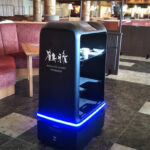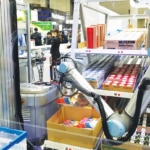ASIA ELECTRONICS INDUSTRYYOUR WINDOW TO SMART MANUFACTURING
Smart Factory & Automation World 2021 Opens in Seoul with 450 exhibitors
Korea is emerging a global test bed for smart manufacturing
Smart Factory & Automation World 2021 opens Sept. 8 at COEX exhibition center in Seoul, attracting about 450 companies at home and abroad to set up 1,800 booths across the show floors
Running through Sept. 10, the 3-day trade show will serve as a showcase of how computing, AI, 5G mobile communications, Big Data Analysis technologies will converge with innovative UI and UX technologies to transform conventional manufacturing facilities in smart, digital manufacturing hub.
True enough, exhibitors are displaying a wide variety of key building block technologies from machine vision system to unmanned robot system to various high-definition smart sensors to VR & AR solution to IoT-based smart factory solutions to Big Data Analytics-based cloud service.
IIoT, or industrial IoT, MES, or manufacturing execution system, AVG, or automated guided vehicles, and PLM, or product life cycle management solution are on display to showcase how they will combine to make dumb factories far smarter, helping not only to save costs and time but also improve efficiency, productivity, and workplace safety.
Cases in points: Neuromeka, a Korean robot system maker, is demonstrating a full suite of smart factory solution system, including collaborative robot “Indy 12”, self-moving robot “Moby” and vision solution “IndyEyer” and remote robot control and guide system “IndyCARE.
World’s First 5G Roll-out
Designed for small and medium-sized manufacturers, the collaborative robot “Indy 12” is a sort of cobot that work together with assembly floor workers, Coming built with an innovative collision detection algorithm, the robot can guarantee workers’ safety.
THiRA UTECH, a smart factory solution provider, also showcases its key smart factory solution, including MES, APS, SCM, MOM, WMS and AMR.
Short for manufacturing execution system, the MES is a full suite of computerized information system that monitors, tracks, and documents the transformation of raw materials to finished products.
APS, advanced planning and scheduling is a sort of automated manufacturing process through which raw materials and production capacity are optimally allocated to meet demand. WMS is a warehouse management system.
Trademarked as THiRAbot, the AMR, or autonomous mobile robot is a vehicle that uses on-board sensors like camera sensors and processors to autonomously move materials.
The robot can recognize the surrounding areas on its own, make a route map for working environments, and autonomously moving back and forth between designated areas carrying materials. It can also recognize a specifically designated person using AI-driven camera sensors and follow him or her keeping optimal distances.
Factories Go Smart
Foreign smart factory solution and system companies like Siemens and Hexagon Manufacturing Intelligence are also joining the show to cash in on Korea’s budding, but fast-growing smart manufacturing solution and system market.
Delivering on its reputation as the world’ first county to start commercial rollout of 5G mobile communications technology in 2019, the Korean government has been working together with the country’s three mobile service carriers to promote 5G B2B service market like smart buildings, smart cities, smart health care and smart factories.
The joint-efforts have well paid off. As of the end of 2020, about 19,799 factories across the country had adopted smart factory system and solutions, according to the government’s statistics.
The ministry of SME and start-up has earmarked 4,37.6 billion won in 2021 alone to subsidize small-and medium-sized companies’ adoption of smart factory system.
According to the ministry, about 6,000 Korean companies plan to transform their factories into smart digital manufacturing hubs in 2021.
Smart factories are sort of souped-up concept of factory automation and unmanned factories, as they can learn by themselves using a machine learning and AI algorithm gathering and analyzing massive amounts of data through tones of sensors networked across factory floors.
As the country’s population is rapidly aging, smart factories will proliferate far faster in the post-Covid 10 era, boosting up demand for smart manufacturing system and solution.




